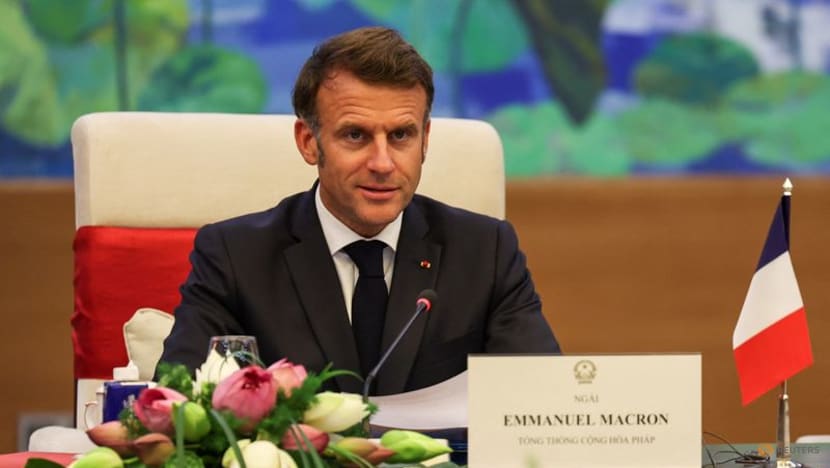French President Macron says US leader Trump and EU's von der Leyen had 'good exchange'

French President Emmanuel Macron attends a National Assembly meeting in Hanoi, during his first official trip to Vietnam on May 26, 2025 (Photo: REUTERS/Chalinee Thirasupa/Pool)
WASHINGTON/BRUSSELS: French President Emmanuel Macron said on Monday (May 26) that European Commission President Ursula von der Leyen and US President Donald Trump had a "good exchange" and that he said he hopes they can get to the lowest tariffs possible.
"The discussions are advancing. There has been a good exchange between President Trump and President Von der Leyen, and I hope we can continue on this road and return to the lowest possible tariffs that will allow for fruitful exchanges," Macron told reporters during a trip to Vietnam.
An EU spokesperson also said on Monday that a weekend telephone call between US President Donald Trump and EU chief Ursula von der Leyen gave "new impetus" to trade talks.
After the conversation, Trump dropped his threat to impose 50 per cent tariffs on imports from the European Union next month, restoring a July 9 deadline to allow for talks between Washington and the 27-nation bloc to produce a deal.
The US President said it was "a very nice call" with the EU Commission chief, and the delay on tariffs would allow for talks between Washington and the 27-nation bloc to produce a deal.
ABOUT TURN ON TRADE POLICY
The about-turn reminded policymakers and investors how quickly Trump's trade policy could change, however, and it was clear how the EU would square its push for a mutually beneficial trade deal with US calls for steep concessions.
Commerzbank currency strategist Michael Pfister said the European Union could reach a deal with the US by July 9, but that Friday's announcement made clear the respite was temporary."It is questionable what has changed in terms of the fundamental problems following a phone call," he said.
EU COMPANIES ON EDGE
Several business leaders said the sheer uncertainty made it hard to plan anything.
Gianmarco Giorda, managing director of Italy's auto part maker lobby group ANFIA, told Reuters he still hoped the talks would succeed but that formulating strategies was complicated:
'US duties are an additional source of concern in an already difficult scenario for the Italian automotive industry."
Germany's family-owned LAPP Group, which makes everything from cables and wires to robotics for factories, warned that some of its specialised products would still be affected by the volatile business environment.
"Unfortunately, current US politics is characterised by unpredictability, individual interests and populism," CEO Matthias Lapp told Reuters.
"Germany's good transatlantic relations have been built up over decades of diplomatic work and mutual understanding. However, confidence in their stability is currently suffering massive damage."
EU-US NEGOTIATIONS WERE STUCK
The negotiations had been stuck, with Washington demanding unilateral concessions from Brussels to open up to US business while the EU seeks an agreement in which both sides could gain, according to people familiar with the talks.
The EU already faces 25% US import tariffs on its steel, aluminium and cars and so-called "reciprocal" tariffs of 10% for almost all other goods, a levy that had been due to rise to 20% after Trump's 90-day pause expires in July.
The levy could increase to 50% in a no-deal scenario, which could raise consumer prices on everything from German BMWs to Italian olive oil and hurt demand for French luxury handbags from LVMH.
It was not clear, however, whether the 50% would be levied on imports not subject to the US 'reciprocal' tariff, such as steel, cars and other products subject to investigations, such as semiconductors, pharmaceutical products and lumber.


















